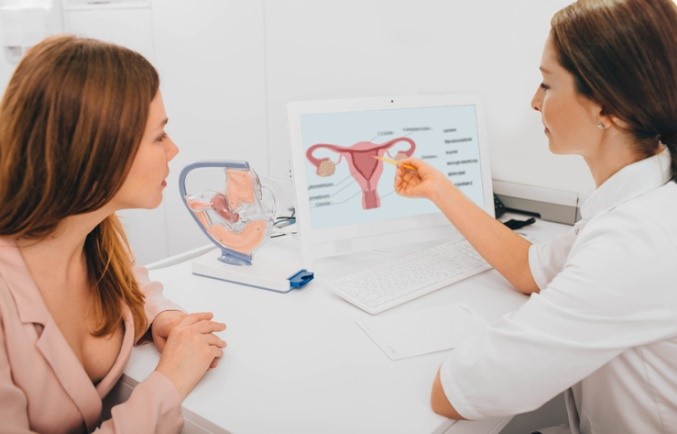
When you begin testing, and subsequent treatment for infertility, there are so many unfamiliar buzzwords and names being tossed about you probably feel like you need a cheat sheet of definitions so you can understand. Get ready because by the time you’re holding your little bundle of joy you’ll feel like a walking glossary of fertility terms.
If your physician suspects irregular, or non-existent, ovulation is behind your inability to become pregnant, they may suggest ovulation induction to get things going. As you know, ovulation is the process by which your body releases a mature egg, ready to be fertilized. The inability to ovulate regularly, or the absence of ovulation affects 25%-30% of women who experience infertility.
Ovulation induction uses medications to promote ovulation, increasing your odds of producing a viable egg which can be fertilized. The end goal of ovulation induction is to increase a woman’s ability to become pregnant, either through timed intercourse, intrauterine insemination, IVF or other treatment for infertility.
The Need for Ovulation Induction
Determining whether or not you ovulate is the first step in knowing if ovulation induction is the right treatment for you. Your doctor may test your urine for the presence of luteinizing hormone, which surges before you ovulate, a trans-vaginal ultrasound may be ordered, or you may undergo another form of testing which allows the doctor to understand your ovulation cycle.
Those conditions associated with the use of ovulation induction are:
- Conditions such as polycystic ovary syndrome, which inhibit or interrupt ovulation.
- Imbalances in levels of reproductive hormones.
- Disorders which indirectly impact ovulation such as auto-immune conditions and thyroid disorders and eating disorders.
- Obesity or being underweight
- Overtraining and athletics that can affect your cycle
Medications Used for Ovulation Induction
Should your physician determine ovulation induction is necessary you will be prescribed medications. These medications are hormone-based and designed to help regulate your reproductive hormones and increase your odds of ovulation. Some of the common medications prescribed for ovulation induction are:
- Clomiphene Citrate also called CC: For women who have normal pituitary hormones, but for whom the cycle-related changes in hormones are not occurring, CC acts as a hormonal stimulant. This is one of the most common ovulation induction medications and more widely recognized by the name Clomid.
- Insulin-Sensitizing Agents: For women who have PCOS, it’s not uncommon to have evidence of pre-diabetes or be diagnosed with diabetes. Insulin sensitizing medication minimizes androgen production and ovulation resumes. The commonly known name for this drug is Metformin.
- Aromatase Inhibitors: This hormonal medication works much like CC in that it acts directly to stimulate ovulation. Aromatase inhibitors are proven effective for some patients who suffer from PCOS. Letrozole and the brand name Femara are more recognizable names for this medication.
- Gonadotropins: Gonadotropins consist of two separate injectable hormone-based medications. Luteinizing hormone (LH) and follicle stimulating hormone (FSH) are normally produced by the pituitary gland and are instrumental in egg development. Gonadotropins are very effective and very powerful hormonal simulators. Because of this you will be under closer medical supervision during your treatment than you would be with other ovulation induction medications. This will help minimize risks including ovarian hyper stimulation, which can result in painfully swollen ovaries and multiple embryos.
Who Are the Best Candidates For Ovulation Induction?
Those who benefit from ovulation induction are women with irregular cycles or for whom ovulation is non-existent. Women who suffer from interrupted ovulation, such as those with PCOS, are also excellent candidates for ovulation induction.
For those couples and individuals who plan to undergo IVF, ovulation induction is part of the treatment. The medication helps the woman to release multiple eggs which can then be determined healthy and viable for in-lab fertilization.
What Are the Risks and Side Effects?
The biggest risk associated with ovarian induction is ovarian hyper stimulation syndrome or OHSS. As mentioned above OHSS can cause painful swelling of the ovaries, however, with medical intervention the side effect is manageable. Symptoms of OHSS include:
- Bloating
- Nausea
- Dizziness
- Blurred vision
- Headaches
- Trouble breathing
- Tenderness and pain in pelvic region
- Hot flashes
- Weight gain
Another risk of ovarian induction is the possibility of multiple embryos due to super ovulation. With a multiple pregnancy come risks such as loss of pregnancy, premature birth and other complications to the mother and fetuses. This is why it’s imperative that your physician monitor you during treatment.
The Benefits of Ovulation Induction
Ovulation induction is typically the first course of treatment for infertility. It is non-invasive. Ovulation induction also improves your odds when used in conjunction with IVF and IUI. Once fertility resumes your odds of pregnancy, depending on any underlying fertility issues, are very positive.


